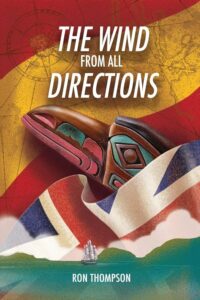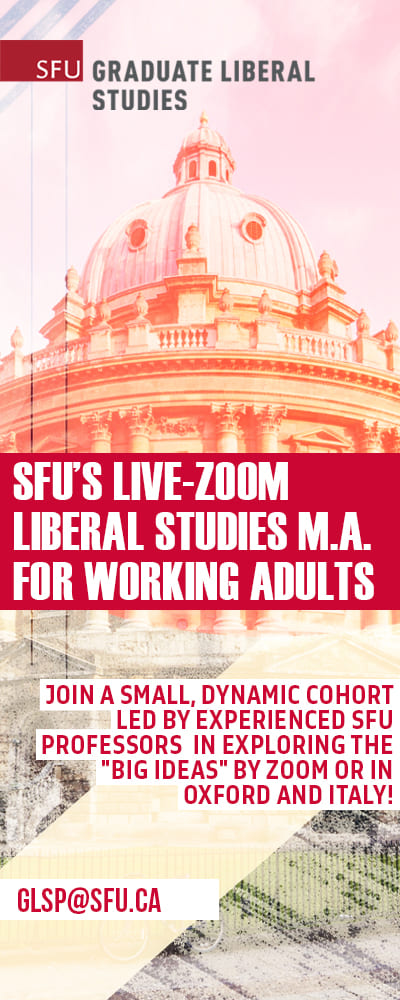A murder in 1792
The Wind from All Directions
by Ron Thompson
Toronto: Double Dagger Books, 2024
$22.99 / 9781990644900
Reviewed by Ron Verzuh
*

The field of historical fiction is packed with bestselling authors like Robert Harris (Conclave), Ken Follett (Pillars of the Earth) and Hillary Mantel (Wolf Hall). These are the literary giants of the genre whose works are known the world over through film versions, talk show appearances, and book review praise. How does Ron Thompson compare?
Fairly well, I would argue. Thompson’s historical novel does not reach the multi-volume heights of the big three, but he offers BC readers something special in setting his comparatively short account smack dab in the middle of the Pacific province’s early history.
The book, set on the BC coast (a map is provided showing the northwest corner of Vancouver Island), covers a brief moment in our past brought to life through the redoubtable engagement of Britain’s Captain George Vancouver and his equally impressive adversary Spanish Commodore Juan Francisco de la Bodega y Quadra.
In 1792, the two dance a diplomatic waltz around the 1790 Nootka Sound Convention, which our trusty Canadian Encyclopedia tells us “averted a war between the two countries over overlapping claims to portions of the Pacific Northwest coast of North America.” It is the tension created by the potential clash of nations that drives the novel.
Historical novels can get bogged down in nautical, legal, and military details. Not so much here, although Thompson shows a solid knowledge of such ephemera and uses an impressive ship’s vocabulary. (Those who want more can dip into Patrick O’Brian’s Master and Commander series.)

Instead, Thompson (Poplar Lake) fills his narrative with the personalities involved. Not only do we learn about Captain Vancouver, known here as Van, and Quadra, both gentleman intent on honouring their country, but we are also voyeurs peeking into the daily lives of the various crew members on their respective ships, the Discovery and the Activa.
The cast of characters runs almost three pages, rivaling Gabriel Garcia Marquez’ classic One Hundred Years of Solitude (now a Netflix series for those who had trouble sorting out the players), and comparisons don’t stop there.
Captain James Cook of the Endeavour gets a cameo role, which alludes to Vancouver’s role in Cook’s historical world voyages and Cook’s eventual death in the Sandwich Islands (now Hawaii). Also making a brief appearance is Captain William Bligh of the Bounty. Bligh followed Cook’s voyages, leading to the infamous Bounty mutiny.
Thompson adds some magical realism in the form of an observant raven and some treachery to his historical saga. The “irritable raven” takes us into the flourishing communities of North Vancouver island around Nootka Sound and Clayoquot Sound, where First Nations have lived for millennia. Here we meet Maquinna, chief of the Mowachaht (today’s Nuu-chah-nulth people), and we witness the exploitation that came with early explorers thirsting for the riches of furs and gold.
Stationed in the isolated region for months, young sailors are also hungry for rum and young women. Unscrupulous American traders provide the first and Maquinna provides the second partly in the form of female slaves. Fortunately, Thompson does not slide into melodrama, but depicts credible scenes of the sailors’ carnal encounters, leading to drunken violence fuelled by jealousy and greed.
A murder occurs in the last third of the book records the event and the search for the culprit. We know who did it, but Vancouver and Quadra do not. The ensuing intrigue brings the wise Maquinna into the discussion, adding the possibility of a clash with the British and Spanish. Also at risk is another war between Britain and Spain that leads to a cover-up strategy to protect an undisciplined young midshipman whose family is connected to royalty.
At the end, we take an interesting turn to the present wherein the author, a.k.a. “our Hemingway,” revisits his own travels to Nootka Sound and the research trail he followed. The pivot was jarring at first, but I liked Thompson’s humble honesty and his humour in assessing how he came to write his story.
Taking the persona of the raven, the author writes “My work here is done. I catch a draft and rise, circling wider to veer away. Of course, the wind is back, gusting from all directions. It carries me. I soar.”
Meanwhile, readers are invited to ground themselves in the numerous non-fiction sources use to recount this tiny moment in the history of imperialist Europe’s conquest of the New World.

*

Ron Verzuh is a writer and historian. [Editor’s note: Ron has recently reviewed books by John Ibbitson (ed.), Bob McDonald, Rosemary Cornell, Adrienne Drobnies, and Tim Bray [eds.], Derek Hayes, George Galt, David Lester and Marcus Rediker with Paul Buhle, and David Spaner for BCR.]
*
The British Columbia Review
Interim Editors, 2023-26: Trevor Marc Hughes (non-fiction), Brett Josef Grubisic (fiction and poetry)
Publisher: Richard Mackie
Formerly The Ormsby Review, The British Columbia Review is an online book review and journal service for BC writers and readers. The Advisory Board now consists of Jean Barman, Wade Davis, Robin Fisher, Barry Gough, Hugh Johnston, Kathy Mezei, Patricia Roy, and Graeme Wynn. Provincial Government Patron (since September 2018): Creative BC. Honorary Patron: Yosef Wosk. Scholarly Patron: SFU Graduate Liberal Studies. The British Columbia Review was founded in 2016 by Richard Mackie and Alan Twigg.
“Only connect.” – E.M. Forster































3 comments on “A murder in 1792”
Don Gutteridge, the prof/poet/writer, did a wonderfully experimental book back in 1975 called Borderlands that explored some of these themes in that place.
Doug Barbour in the Dalhousie Review characterized it as “a series of poems ‘about’ the story of John Jewitt’s three years with the Nootkas after he was taken prisoner by Maquinna, their chief, in 1802.”
I remember the line/image of Maquinna “slicing their heads open like cabbages”. How wise that was in light of colonial imperatives?
Its hard to imagine Cataluna guardsmen in Nootka but there they were before the Quadra & Vancouver agreement came to pass.
Ahh, but the Spanish were fools and allowed their territorial advantage to slip. Godoy knew this only too well but he didn’t care and this led to the Peninsular Wars and all of the illustrations and scientific work of the Malaspina expedition had to be carted by wheelbarrow to Montpelier to be protected and evaluated by De Candolle after he became the main botanist at Geneva. Long live Thaddeus Haenke!
Thanks for the review. Can’t wait to read this!